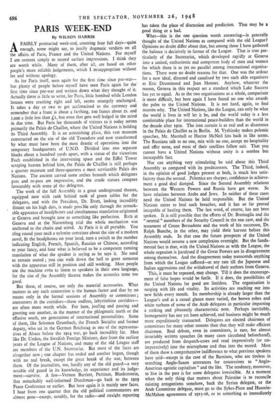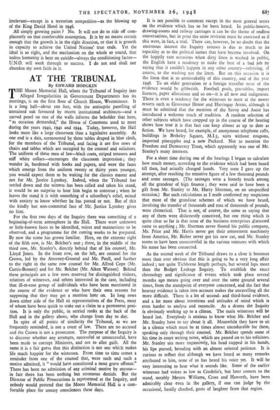PARIS WEEK-END
By WILSON HARRIS
AFAIRLY protracted week-end, counting four full days—quite enough, some might say, to justify dogmatic verdicts on all the affairs of Paris, France and the United Nations. For myself I am content simply to record surface impressions. I think they are worth while. Many of them, after all, are based on other people's more reliable judgements, which I misappropriate without fee and without apology.
As for Paris itself, seen again for the first time since pre-war-- but plenty of people before myself have seen Paris again for the first time since pre-war and written down what they thought of it. Actually there is little to write, for Paris, little bombed while London houses were crashing right and left, seems strangely unchanged. It takes a day or two to get acclimatised to the currency and remember that a franc is about a farthing, too francs about 2S. and i,000 a little less than Li, but even that gets well lodged in the mind in due time. But Paris for thousands of visitors to it today means primarily the Palais de Chaillot, where the United Nations is holding its Third Assembly. It is an astonishing place, this vast museum constructed on the site of the old Trocadero and now transformed by what must have been the most drastic of operations into the temporary headquarters of U.N.O. Divided into two separate blocks about a hundred yards apart, with a statue of the victorious Foch established in the intervening space and the Eiffel Tower scraping heaven behind him, the Palais de Chaillot is still perhaps a quarter museum and three-quarters a most serviceable Palais des Nations. The ancient carved stone arches beneath which delegates pass and re-pass are impressive, and the crude statues compare favourably with some of the delegates.
The work of the full Assembly in a great underground theatre, equipped now with rank behind rank of green tables for the delegates, and with the President, Dr. Evatt, looking incredibly distant on his high dais, is made poss:ble only through the remark- able apparatus of headphones and simultaneous translation originated at Geneva and brought now to something like perfection. Both at Geneva and at the Nuremberg trial the whole mechanism was anchored to the chairs and wired. At Paris it is all portable. You sling round your neck a xylonite container about the size of a modern novel, fit the headphones on your head, turn a switch to the number indicating English, French, Spanish, Russian or Chinese, according to your fancy, and hear what is believed to be a competent running translation of what the speaker is saying as he says it. No need to remain seated ; you can walk down the hall to greet someone with the apparatus still in position and still working. Most people use the machine even to listen to speakers in their own language, for the size of the Assembly theatre makes the acoustics none too good.
But these, of course, are only the material accessories. What matters in any such connection is the human factor and that by no means only in the formal sessions of Assembly or committees ; encounters in the corridors—these endless, labyrinthine corridors— are often more worth while. For here, jostling and passing and greeting one another, in the manner of the phlegmatic north or the effusive south, are generations of international personalities. Some of them, like Solomon Grumbach, the French Socialist and former deputy, who sat in the German Reichstag as one of the representa- tives of Alsace before the 194 war, go back incredibly far. Men like Dr. Unden, the Swedish Foreign Minister, date from the earliest years of the League of Nations, and many of the old League staff are members of the U.N. Secretariat. But most of the faces are altogether new ; one chapter has ended and another begun, though with no real break, except the great break of the war, between them. Of the journalists, too, hardly any of the old guard—a very notable old guard in its knowledge, its experience and its judge- ment—survive. A few—Vernon Bartlett, Pertinax, Blankenstein, that remarkably well-informed Dutchman—go back to the 1919 Peace Conference or earlier. But here again it is mainly new faces. I hear from one quarter that the old political commentators are almost gone—except, notably, for the radio—and straight reporting
has taken the place of discussion and prediction. That may be a good thing or a bad.
What—this is the one question worth answering—is generally thought of the United Nations as compared with the old League? Opinions no doubt differ about that, but among those I have gathered the balance is decisively in favour of the League. That is true par- ticularly of the Secretariat, which developed rapidly at Geneva into a united, enthusiastic and competent body of men and women for which there is as yet no parallel among international organisa- tions. There were no doubt reasons for that. One was the ardour for a new ideal, directed and canalised by two such able organisers as Eric Drummond and Jean Monnet. Anyhow, whatever the reason, Geneva in this respect set a standard which Lake Success has yet to equal. As to the two organisations as a whole, comparison is more difficult, but here again I have found no one who awards the palm to the United Nations. It is not hard, again, to find reasons why. The United Nations, like the League, can only be what the world it lives in will let it be, and the world today is a less comfortable place for international peace-builders than the world in the decade after 1920. The iron curtain is as real and as disastrous in the Palais de Chaillot as in Berlin. M. Vyshinsky makes polemic speeches, Mr. Marshall or Hector McNeil hits back in like terms. The Russians talk to no one, mix with no one, accept no hospitality and offer none, and most of their satellites follow suit. That you cannot have a United _Nations without unity is a sombre but inescapable fact.
Nor can anything very stimulating be said about this Third Assembly as compared with its predecessors. The Third, indeed, in the opinion of good judges present at both, is much less satis- factory than the second. ,Polemics are sharper, confidence in achieve- ment a good deal damped. Since the Second Assembly relations between the Western Powers and Russia have got worse. So have relations between Arabs and Jews. In neither of these cases need the United Nations be held responsible. But the United Nations exists to heal such breaches, and it has so far proved incapable of healing them. The last word, of course, has not been spoken. It is still possible that the efforts of Dr. Bramuglia and the " neutral " members of the Security Council in the one case, and the testament of Count Bernadotte and the work of his successor, Dr. Ralph Bunc.he, in the other, may yield their harvest before this Assembly ends. In that case the future prospects of the United Nations would assume a new complexion overnight. But the funda- mental fact is that, with the United Nations as with the League, the whole organism is 'Paralysed if the Great Powers are in disagreement among themselves. And the disagreement today transcends anything from which the League suffered—at any rate till the Japanese and Italian aggressions and the withdrawal of their authors from Geneva.
This, it must be repeated, may change. Till it does the encourage- ment of false hopes would be futile. If it does, the possibilities of the United Nations for good are limitless. The organisation is surging with life and vitality. Its activities are reaching out into new fields every month. Its membership is already larger than the League's and at a casual glance more varied, the brown robes and white turbans of some of the Arab delegates in particular importing a striking and pleasantly characteristic note. Perhaps inevitably, homogeneity has not yet been achieved,-and business might be much more expeditiously transacted. Delegates are elected chairmen of committees for many other reasons than that they will make efficient chairmen. Real debate, even in committees, is rare, for almost invariably written speeches (in many cases circulated beforehand), are produced from despatch-cases and read impressively (or un- impressively) into the microphone and thus into the record. Most of them show a comprehensive indifference to what previous speakers have said—except in the case of the Russians, who are tireless in searching Anglo-Saxon utterances for concessions to "Anglo- American egoistic capitalism" and the like. The tendency, moreover, to live in the past is for some delegates irresistible. At a moment when the only thing that matters about Palestine is to reconcile existing antagonisms somehow, back the Syrian delegate, or the Arab Committee delegate, must go to the Sykes-Picot and Hussein- McMahon agreements of 1915-16, or to something as immediately irrelevant—except in a terrorism competition—as the blowing up of the King David Hotel in 1946.
All simply growing pains ? No. It will not do to ride off com- placently on that comfortable assumption. it is by no means certain enough that the growth is in the right direction, or that it is growth in capacity to achieve the United Nations' true ends. Yet the ideal is so right, and the mechanism on the whole so sound, that unless humanity is bent on suicide—always the conditioning factor- U.N.O. will work through to success. I do not and shall not abandon my own faith in it.





































 Previous page
Previous page